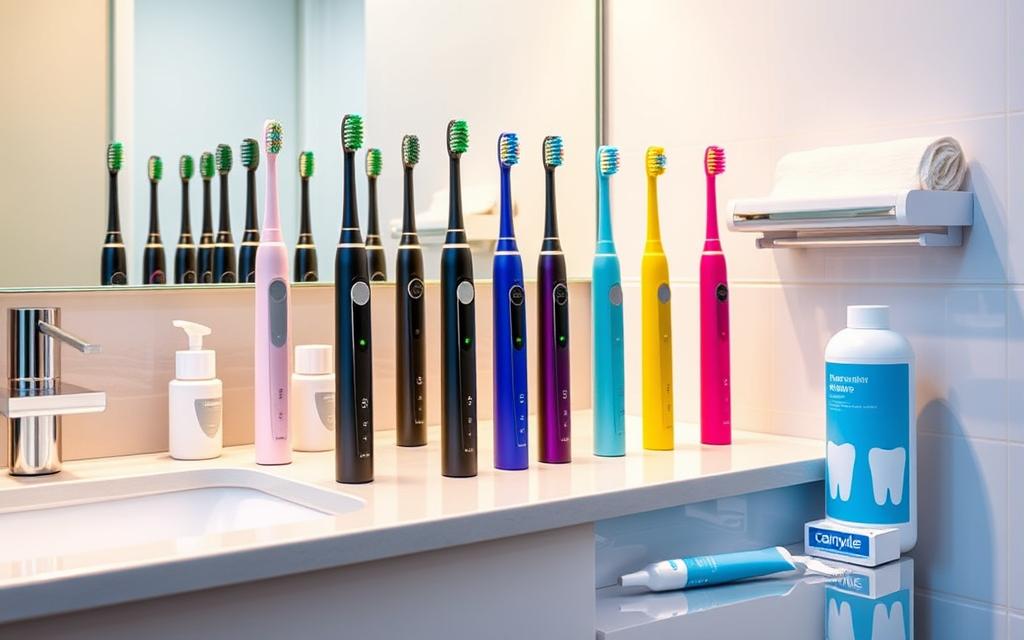Good oral health is key to overall well-being. Regular dental care is vital in stopping common oral diseases. Neglecting dental care can lead to serious problems, affecting your teeth, gums, and overall health. Visiting the dentist regularly and practicing good oral hygiene are essential. They help keep your mouth healthy and prevent many oral health issues. By focusing on preventive dentistry, you can protect your teeth and gums for a lifetime of beautiful smiles.
In this article, we’ll talk about the importance of preventive dental care. We’ll also look at early signs of common oral diseases and share tips for regular dental care. Understanding the link between oral health and overall wellness helps you take care of your teeth and gums. This way, you can enjoy a healthy, vibrant smile.
Understanding the Importance of Preventive Dental Care
Regular dental check-ups and care are key to good oral health. Professional cleanings remove plaque and tartar, preventing tooth decay and gum disease. Dentists also give fluoride treatments to strengthen teeth and prevent cavities.
The Role of Professional Dental Cleanings: Professional dental cleanings are more than routine. They are crucial for preventive care. Dental hygienists use special tools to clean hard-to-reach areas, beyond what brushing and flossing can do. These cleanings help dentists spot and treat oral health issues early.
Daily Oral Hygiene Best Practices: Daily oral care is vital alongside professional cleanings. Brushing twice a day and flossing regularly remove food and plaque. Using fluoride toothpaste also strengthens teeth and fights cavities.
Impact of Diet on Oral Health: What we eat affects our oral health. Foods high in sugar and starch increase bacteria, leading to plaque and tooth decay. Eating sugar-free and tooth-friendly foods helps keep teeth strong and healthy.
Understanding preventive dental care helps protect our teeth and gums. Regular check-ups, good daily care, and a balanced diet ensure a healthy smile for life.
Common Oral Diseases and Their Early Warning Signs
Good oral health is key, not just for a bright smile. Regular dental visits can stop common diseases like cavities, gingivitis, and periodontitis. They also help catch oral cancer early. Knowing the signs of these diseases is the first step to getting treatment and avoiding bigger problems. Cavities, or tooth decay, are a big oral health issue. They happen when bacteria get into the tooth through a damaged enamel layer. Look out for sensitive teeth, holes in the teeth, and tooth discoloration as early signs.
Gingivitis is the first stage of gum disease, showing as red and inflamed gums. If not treated, it can turn into periodontitis, leading to tooth loss. Signs of gingivitis include bleeding gums, swollen gums, and bad breath.
| Oral Disease | Early Warning Signs |
|---|---|
| Cavities | Sensitive teeth, visible holes or pits, discoloration on tooth surface |
| Gingivitis | Bleeding, swollen, or tender gums, persistent bad breath |
| Periodontitis | Receding gums, loose teeth, persistent bad breath, pus between teeth and gums |
| Oral Cancer | Persistent sore or lump in the mouth, difficulty swallowing, changes in voice |
Periodontitis is sometimes referred to as the advanced stage of gum disease. It leads to gum recession, resulting in loss of teeth and bad breath. It can lead to tooth loss and serious diseases if left untreated. Oral cancer is caused by uncontrolled cells growth in the mouth and can be very lethal disease if it is not detected in its early stages. Look for sore or lump around mouth, swallowing problems, and hoarse voice.
These strategies emphasize routine dental appointments as the primary means for screening such diseases at earlier stages. Instead, detecting such issues on time helps you maintain a healthy smile while reducing the need for costly fixes later.
The Basics of Treatment Maintenance
Every person needs to practice maintaining oral hygiene to effectively prevent regular gum or other dental problems. There are a total three essential components in maintaining an optimal oral hygiene routine which are: brushing and flossing the right way, having good products, and having an appropriate schedule.
Different Ways for Brushing and Flossing: It is important to practice proper brushing and flossing techniques. Use a soft-bristled e toothbrush to brush every surface of your teeth. Keep doing this until you reach the difficult areas. Flossing should be done daily to remove plaque and food debris that your toothbrush cannot reach.
Choosing the Appropriate Dental Care Products: When choosing care for teeth patients should be particular in their choices. Look for toothpaste that contains fluoride which will help in the strengthening of your teeth enamel and promoting greater oral health. As for mouthwash, alcohol-free ones should be preferred as they do not make the mouth dry and do not irritate it. Electric toothbrushes and dental floss tend to be great for oral hygiene.
Arranging Oral Hygiene Activities in a Timely Manner: Consistency is key when it comes to taking care of teeth. Taking time out to brush and floss once or twice each day is advised. In addition, routine check-ups and cleanings by the dentist is also something that should not be neglected. Such a regime helps to control the formation of plaque and tartar which influence the onset of gum disease. The above measures will help you keep that bright smile appealing even as the years fly by.

Oral Health: Is it Intertwined with the Overall health of the body?
Smiles are needed to be beautiful, however perfect oral hygiene has to be maintained as well. Ideal mouth hygiene constitutes a determining factor in the state of one? body as a whole. There has been evidence that patients who do not maintain oral hygiene are also predisposed to illnesses such as heart diseases and diabetes.
Mouth bacteria is directly associated with heart conditions and affects millions of people due to heart conditions which is caused by these germs. Mouth bacteria can easily migrate to the heart, leading to artery narrowing. This causes heart attack and stroke incidences to be higher than normal. Diabetics are also considered to be the worse hit as they are also prone to gum disease thereby worsening their plight.
Additionally, it’s critical for the expecting mothers to pay special attention to their oral health. Neglecting oral hygiene can pose serious complications during pregnancy, such as preterm births, or increased risk for babies with low birth weight. Therefore, regular dental visits and good oral hygiene both contribute tremendously to a healthy pregnancy and healthy baby.
FAQ
What is the importance of regular dental checkups?
Regular dental checkups are key for keeping your mouth healthy. They help catch problems early. This way, dentists can fix issues before they get worse.
How can daily oral hygiene routines help prevent dental problems?
Good daily oral hygiene is vital. Brushing twice a day and flossing keeps your mouth clean. This helps avoid cavities and gum disease.
What is the connection between diet and oral health?
Your diet affects your oral health. Eating too much sugar or acidic foods can harm your teeth. But, a healthy diet can strengthen your teeth and gums.
How can early detection of oral diseases improve treatment outcomes?
Finding oral diseases early is crucial. It makes treatment easier and prevents bigger problems. Regular dental visits help catch issues early.
What are the benefits of using an electric toothbrush?
Electric toothbrushes clean better than manual ones. They have features like timers and pressure sensors. These help you brush more effectively.
How can poor oral health impact overall physical well-being?
Poor oral health is linked to many health issues. This includes heart disease, diabetes, and problems during pregnancy. Good oral hygiene is good for your overall health.







